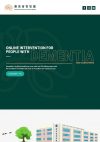CEO of ViewMind Inc, Mark Edwards, discusses overcoming global inequities in cognitive healthcare to combat the dementia epidemic
Unequal access to cognitive healthcare is a key barrier to reducing the ever-increasing rates of brain and neurodegenerative health disorders worldwide. As Alzheimer’s Disease International reports, (1) women and minority groups across the globe are impacted disproportionately by devastating cognitive diseases such as dementia, yet they are less likely to receive a timely diagnosis of their disorder or have access to adequate therapeutic support post-diagnosis.
Despite representing a higher percentage of the affected population, minority groups are more likely to experience discrimination when seeking care for cognitive health disorders. In the United States, 50% of African American dementia patients reported instances of discrimination, as opposed to 9% of non-Hispanic white patients. This pattern is echoed in the experiences of non-white caregivers for dementia patients, many of whom report instances of medical professionals dismissing their concerns or failing to help them navigate the healthcare system for their patients. (2)
With more than 55 million families affected by Alzheimer’s and other dementias worldwide – and an attendant annual cost to the global economy of $2.8 trillion anticipated by 2030 (3) – rectifying disparities in the availability and quality of cognitive healthcare worldwide is paramount.
Cognitive health research impact
Inadequate access to high-quality cognitive healthcare has concerning ramifications for research on cognitive disorders such as dementia. As the Davos Alzheimer’s Collaborative (DAC) reports, the instance of Alzheimer’s disease AD is growing most rapidly in low- and middle-income countries, which comprise more than 70 of the world’s AD cases, as reported by Alzheimer’s Disease International.
Yet, most clinical research on AD is conducted with people from wealthier countries. For example, nearly 80% of genetic studies recruit people of European descent, despite 80% of the global population being from elsewhere. Therefore, research methods must adapt to capture data on a more representative group of dementia patients worldwide.
Global health organizations respond Recognizing the urgency of casting a wider net, the Diversity and Disparity Professional Interest Area of the Alzheimer’s Association International Society to Advance Alzheimer’s Research and Treatment (ISTAART) has urged research bodies to swiftly adapt their studies to better account for previously underrepresented groups. (4)
The DAC is assembling a cohort of one million individuals living with Alzheimer’s around the world, a group that will accurately represent the disease’s global footprint. In addition, the Alzheimer’s Association made addressing health disparities the focus of its 2022 conference (5), and a recent report from the UK Dementia Research Institute urged researchers to explore gender, ethnicity, and socioeconomic factors as they relate to dementia pathology.
ViewMind: Fighting cognitive healthcare inequities
For the past two decades, digital health and artificial intelligence company ViewMind has worked to eliminate global cognitive healthcare inequities by developing easily administered, clinically validated solutions for precision diagnostics of neurocognitive disorders.
ViewMind fills a unique gap with an assessment that works independently of culture, age and education. This is achieved by avoiding stimuli that have education or cultural biases and by harnessing the individual as their own baseline in multi-faceted tests to assess neurodegenerative disorders.
Findings from the non-invasive, 20-minute ViewMind battery of tests offer much of the insight gleaned from diagnostic methods such as cerebrospinal fluid (CSF) analysis and brain imaging, expensive and invasive procedures that are typically only ordered once symptoms of cognitive disorders begin to present – when diseases such as Alzheimer’s have often advanced irreversibly. In addition, ViewMind can accurately assess the preservation of various cognitive domains to understand how an impairment affects the patient’s memory, processing and motor function.
Cognitive markers independent of age, culture & education
Cognition declines with age and levels of education. Today’s cognitive assessment tools cannot objectively measure populations across the globe independently of these variables.
This compounds the challenge for pharmaceutical companies to build objective evidence across diverse populations and for healthcare systems to address global disparities. In addition, many of the most prized tests, such as CSF and PET, are prohibitively expensive and unavailable in most parts of the world.
Already ViewMind is deployed across diverse groups from different cultures, average years of education, and a range of ages, whether from the most advanced hospitals and cities in the world, such as can be found in New York City or from developing regions such as the Amazonia in south America – the results are the same.
Developing a scalable solution in cognitive healthcare
Through its new research centers, ViewMind is answering the call of leading global health organizations to make universal access to high-quality cognitive healthcare a reality. Through such efforts, they are taking important steps toward broadly implementing a novel cognitive assessment tool poised to transform preventive cognitive healthcare worldwide.
References
1. Alzheimer’s Disease International, World Alzheimer Report (https://www.alzint.org/u/World-Alzheimer-Report-2021-Chapter-20.pdf)
2. Centers for Disease Control and Prevention, Barriers to Equity in Alzheimer’s and Dementia Care (https://www.cdc.gov/aging/publications/features/barriers-to-equity-in-alzheimers-dementia-care/index.html)
3. Davos Alzheimer’s Collective, Davos Alzheimer’s Collaborative, World Economic Forum announce major milestones in the global fight against Alzheimer’s disease (https://www.davosalzheimerscollaborative.org/news-and-press/davos-alzheimers-collaborative-world-economic-forum-announce-major-milestones-in-the-global-fight-against-alzheimers-disease)
4. Babulal et al., Perspectives on ethnic and racial disparities in Alzheimer’s disease and related dementias: Update and areas of immediate need (https://alz-journals.onlinelibrary.wiley.com/doi/10.1016/j.jalz.2018.09.009)
5. Alzheimer’s Association, Addressing Health Disparities (https://alz.org/diversity-health-disparity-conference-alzheimers-dementia/overview.asp)

























